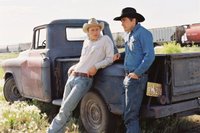quiet revolutions
 The tagline for Queen Latifah’s new movie is, “She always thought she was somebody…and she was.” Which seems to place it in the Person Who Dared To Dream Big school of movies, along with everything from Field of Dreams to Selena to all those quirky English films about frumpy old men who swim the Channel or float across the country on helium balloons tied to a lawn chair.
The tagline for Queen Latifah’s new movie is, “She always thought she was somebody…and she was.” Which seems to place it in the Person Who Dared To Dream Big school of movies, along with everything from Field of Dreams to Selena to all those quirky English films about frumpy old men who swim the Channel or float across the country on helium balloons tied to a lawn chair.The big dream in Brokeback Mountain, which Heather and I saw last night, is to live on a ranch with your gay lover, and in the world the characters reside in, that’s just as crazy as (and far more dangerous than) riding around on an airborne lawn chair. Rodeo cowboy Jack Twist dreams the dream in spite of its potential consequences; his lover Ennis Del Mar wants to stay close to home and as close to traditional family life as he can bear.
Besides the film’s obvious revolutionary-ness (big budget movie with a gay love story at its center), I was impressed by the its guts in saying, basically, you’re damned if you do and you’re damned if you don’t. Jack is punished for taking chances, and Ennis is punished for not taking chances.
Hollywood loves to depict people triumphing over adversity rather than suffering under it, and amid the gorgeous landscapes and slow, tender scenes of Brokeback Mountain, it’s almost possible to forget how many traditions are being bucked, which is often the best way to buck them. (Pardon the rodeo pun—it’s a holdover from my days as an Entertainment Weekly intern.)
The beginning of the film features several scenes of Ennis and Jack sitting by the campfire—cooking, eating, pitching the tent, peeing in the dirt. It’s not homoerotic so much as homo-domestic. As Susan Faludi suggests in her book Stiffed, a lot of straight men treasure environments—such as military school—where they’re allowed to be nurturing toward and be nurtured by other men. But these environments are fiercely guarded because outsiders might see this behavior as gay. And while a certain amount of progress has been made in the “being sensitive doesn’t mean you’re gay” arena, not a lot has been made in the “so what if you are gay?” realm.
And so Brokeback takes a medium-sized but very significant step toward the “so what?” that so many of us have been trying to say for so long.
As Heather and I left the theater, she wondered, “Is this movie being protested somewhere? I haven’t heard anything, but I feel like it would be. I would be really happy if it’s not. I’d like to think everyone is open-minded enough to deal with this stuff now.”
“I don’t know,” I admitted. “I’m sure some rural people must be pretty shocked by it. They’re shocked to learn, ‘Oh, wow, people like us can be gay.’ But it’s also kind of groundbreaking in cities too. Gay people in LA are like, ‘Oh, wow, people like us can live in trailers and own only one jacket.’”
Good work, Brokeback.



Comments